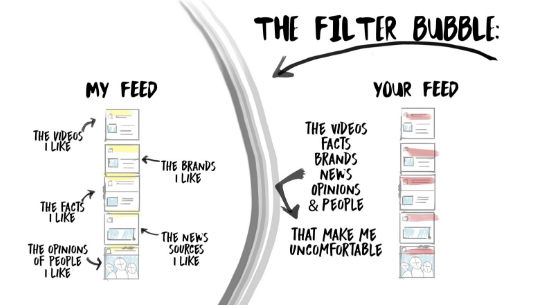Enjoy dynamic listening on the go—this podcast, AI-generated for your convenience, is perfect for driving, commuting, or waiting in line!
Following Eli Pariser’s statement: “Your filter bubble is your own personal, unique universe of information that you live in online. And what’s in your filter bubble depends on who you are, and it depends on what you do”.
Basically, in case you are not aware of this: search engines and social network trapped you in a bubble. It’s a custom made and personalized universe, where you only:
- listen opinions aligned with your beliefs
- read articles which reinforce your opinions
- watch videos which match with your tastes
In other words, since the content is biased by your past queries and clicks, you are slave to your beliefs.
It is the result of a shift in the power of choice from the consumers of content to the producers. I mean, just ten years ago, the consumer bought the newspapers aligned with his political and economical view (pull), while today the tailored content is provided to already segmented and targeted consumers (push).
In a world where the borderline between atoms and bits is every day more fuzzy, this trap will be more effective. For example, let’s think at the suggestions you could get from Google Maps to find shops, stores etc.
There are so many reasons to explain the Filter Bubble phenomenon, but the most important is the strong effort to maximize profits from advertising (Google and Facebook) or to suggest you the most relevant content aligned with yours interests, which in turn, will convert into sales.
There are a plenty of articles about how to hack the Google and Facebook’s algorithm to avoid the filter bubble trap, like this. You can just surf around the internet to find tons of suggestions about it.
At the very beginning it could seem a paradise, but in reality it is a nightmare! To expand your view, discover new things or simply approach matters with a critical eye, you need to listen to different opinions. This is becoming every day harder in the world of Google, Facebook, Netflix and Amazon.
Food for thoughts.
